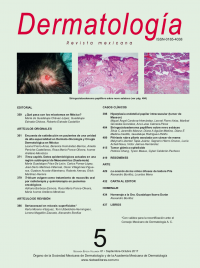Barbosa-Zamora A1, Ponce-Olivera RM2, Arellano-Mendoza MI3
1 Residente de Cirugía Dermatológica y Dermato-Oncología.
2 Profesora adjunta del servicio de Dermatología.
3 Jefa del servicio de Dermatología.
Hospital General de México Dr. Eduardo Liceaga, Ciudad de México.
Resumen
ANTECEDENTES: la mucositis oral es un síndrome manifestado por eritema, edema, sangrado y ulceración de la mucosa oral, la administración de radioterapia, quimioterapia o ambas es una de sus causas. Se considera la complicación no hematológica más severa asociada con este tipo de tratamientos. Existen varias opciones de tratamiento; sin embargo, no hay un patrón de referencia. Las fitoestimulinas son sustancias que se producen al germinar semillas de gramíneas en condiciones particulares. Estas sustancias, en particular el extracto obtenido del trigo (Triticum vulgare), estimulan la síntesis de ARNm y del ADN en fibroblastos y linfocitos, activan los fenómenos de cicatrización y reepitelización al aumentar la quimiotaxis y maduración de fibroblastos y, por consiguiente, su capacidad de síntesis de fibras colágenas y glucosaminoglucanos.
OBJETIVO: determinar la eficacia y seguridad de Triticum vulgare en el tratamiento de la mucositis oral causada por radioterapia y quimioterapia comparada con tratamiento convencional.
MATERIAL Y MÉTODO: estudio piloto efectuado a través de un ensayo clínico, controlado, con distribución al azar, abierto, unicéntrico, realizado en el Hospital General de México Dr. Eduardo Liceaga de julio a septiembre de 2016. Participaron dos grupos de pacientes con diagnóstico clínico de mucositis oral por quimioterapia o radioterapia de cabeza y cuello. Un grupo recibió Triticum vulgare y el otro grupo fue control o testigo.
RESULTADOS: se incluyeron 40 pacientes (20 en cada grupo), valorados con las escalas OMAS y OAG. A la semana 3 no hubo diferencia estadísticamente significativa entre los dos grupos. Los efectos adversos más reportados fueron mal sabor al momento de la aplicación y ardor leve en el área tratada.
CONCLUSIONES: la aplicación de Triticum vulgare en el tratamiento de la mucositis oral por radioterapia, quimioterapia o ambas de cabeza y cuello no modifica su evolución, se evidenció curación por igual a la tercera semana. Por tanto, se concluye su no inferioridad respecto del tratamiento convencional.
PALABRAS CLAVE: mucositis, Triticum vulgare, fitoestimulinas, radioterapia, quimioterapia.
Triticum vulgare as treatment of oral mucositis by radiotherapy and chemotherapy in cancer patients.
Dermatol Rev Mex. 2017 September;61(5):379-385.
Barbosa-Zamora A1, Ponce-Olivera RM2, Arellano-Mendoza MI3
1 Residente de Cirugía Dermatológica y Dermato-Oncología.
2 Profesora adjunta del servicio de Dermatología.
3 Jefa del servicio de Dermatología.
Hospital General de México Dr. Eduardo Liceaga, Ciudad de México.
Abstract
BACKGROUND: Oral mucositis is a syndrome composed by erythema, edema, bleeding and ulceration of the oral mucosa, being one of the causes the administration of radiotherapy and/or chemotherapy. It is considered the most severe nonhematologic complication due to this treatment. In the management, there is no gold standard. The fitostimolines are obtained from germinating seeds under particular conditions. These substances, in particular the extract obtained from wheat (Triticum vulgare), stimulate the synthesis of mRNA and DNA in fibroblasts and lymphocytes, and activate the phenomena of healing and re-epithelialization, by increasing the chemotaxis, and fibroblastic maturation and consequently their ability to synthesize collagen fibers and glycosaminoglycan’s.
OBJECTIVE: To determine the efficacy and safety of Triticum vulgare in the management of oral mucositis caused by radiotherapy and chemotherapy compared to conventional treatment.
MATERIAL AND METHOD: A prospective, randomized, open, single-center, pilot study was done at Hospital General de Mexico Dr. Eduardo Liceaga from July to September, 2016. Patients were divided into two groups: group A received treatment with Triticum vulgare plus standard management and group B, only standard treatment.
RESULTS: Forty patients were included, 20 in each group. Patients were evaluated with the OMAS and OAG scales. At week 3 there was no statistically significant difference between the two groups. The most commonly reported adverse effects were poor taste at the time of application and mild burning in the treated area.
CONCLUSION: The use of Triticum vulgare in oral mucositis by radiotherapy and/or chemotherapy of the head and neck does not modify its evolution, evidencing its healing by the same to the third week. Therefore its non-inferiority with respect to the conventional treatment is concluded.
KEYWORDS: mucositis; Triticum vulgare; fitostimoline; radiotherapy; chemotherapy

